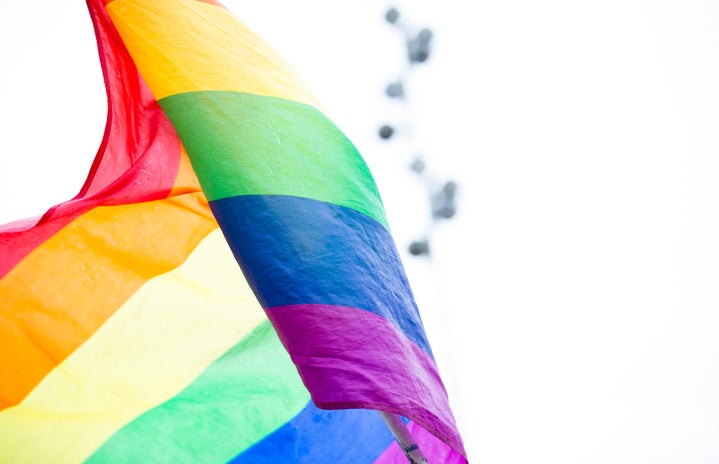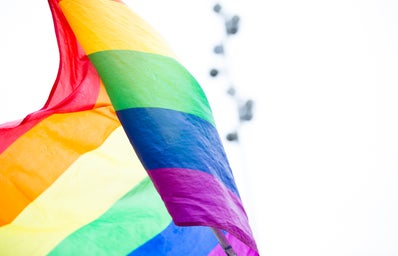One of the easiest ways you can be an ally to your LGBTQ+ friends is by being aware of heteronormativity and by expressing this in your everyday vocabulary. Heteronormativity is so present in our lives that if you’re cishet (cisgender & heterosexual), you probably don’t even notice it. It’s a privilege not to be affected by heteronormativity, but your complacency is hurting your queer friends and family. People in the LGBTQ+ community are negatively impacted by heteronormativity every single day. It’s not enough anymore to not be homophobic, if you want to be an ally, you have to make an effort to be more inclusive in your language.
What is heteronormativity?
Heteronormativity is the idea that being heterosexual, or straight, is the “normal” and “correct” sexuality and that anything else is considered unnatural and deviant. This idea is harmful to queer folk because it tells us that our sexualities and gender identities have no place in society and that being cisgender and heterosexual are the only acceptable identities. This idea is homophobic, transphobic and completely incorrect. LGBTQ+ love is love no matter what. The more people who act like it, the better.
- Don’t assume everyone is straight
-
This is the foundation of heteronormativity. Assuming that everyone around you is straight is not only inaccurate but hurtful. Not everyone is heterosexual and acting like they are is LGBTQ+ erasure.
I’ve even read Her Campus articles that do this. While Her Campus is geared towards college-aged women, not all of these women are straight. And yet, I still read articles on our site that imply that girls are only attracted to boys, with quotes like “If you feel like you’re always competing with your friend (whether it’s through school, boyfriends, other friends…or any other achievements)” and “If you’re taking the time out of your day…to hold a conversation with a boy who gives you three-word answers…you need to block him or ghost him immediately.” As a reader who identifies as pansexual, it leaves a bad taste in my mouth while reading otherwise great articles.
Everyone has made these mistakes at some time or another in our lives, including me. My goal isn’t to call anyone out but simply to draw attention to damaging language that might otherwise go unnoticed.
- Use gender-neutral language when referring to a stranger
-
This is one that many people, including myself, tend to have trouble with. Because we live in a society where we are taught that gender is defined by clothing, hair, body parts, etc., it can be especially difficult to unlearn these societal constrictions. Gender is a social construct and often has no correlation with any of these things.
Just because someone on the street is wearing a dress, doesn’t mean they use she/her pronouns or even identify as a woman. To avoid misgendering someone, always use they/them pronouns to refer to strangers, or ask them for their pronouns. It never hurts and always helps. For example, try saying “I love their hair” instead of “I love his hair” or “That person has great style” instead of “That girl has great style.”
- Use the right pronouns & names
-
According to UT News, using the right pronouns can literally save lives. “Compared with peers who could not use their chosen name in any context, young people who could use their name in all four areas experienced 71 percent fewer symptoms of severe depression, a 34 percent decrease in reported thoughts of suicide and a 65 percent decrease in suicidal attempts.” Using someone’s correct pronouns and their chosen name drastically decreases their likelihood of attempting suicide but not only that. It conveys a level of respect you have for a person and their gender identity that everyone has no issues conveying to cisgender people.
If you really believe in equality, that includes giving everyone that same level of respect, even if you don’t like them as a person. Remember that there is never a good reason for misgendering someone, no matter what they do. If cisgender people are given this respect without a second thought, you can give the LGBTQ+ community that same respect.
Another aspect of this is using all of someone’s pronouns. If you have a friend who uses she/they pronouns, use their pronouns equally or use whichever pronouns they prefer to be used more/less. Reverting back to she/her pronouns is the easy way out, but ignoring your friend’s they/them pronouns is another form of erasure.
Even so, remember to always ask your friends who they are comfortable using their correct pronouns in front of. Many people in the LGBTQ+ community are not out to their families, and you don’t want to endanger someone’s safety by using their correct pronouns at the wrong time.
- Don’t interrogate people about their sexuality and/or gender identity
-
One of the reasons I’m writing this article is because I realized most of this isn’t common knowledge. It makes sense. Unless you see an Instagram infographic about it or read a helpful Twitter thread, a lot of this information might never have crossed your mind. And I get it. How would you know what to look for if no one tells you? Why haven’t your LGBTQ+ friends ever told you about any of this? That’s because we’re tired of explaining it to you.
It’s not our responsibility to justify our identities to you. Unless we bring it up in discussion or have made it clear that we’re comfortable talking about it, there is no reason to question someone about their sexuality and/or gender identity. You might be curious, but you could just look it up. Google is a fountain of knowledge that doesn’t get emotionally exhausted from having to explain things to cishets so utilize that instead.
- Do research
-
This transitions perfectly into my final piece of advice: do your research. If a friend or family member comes out to you, do research to figure out how you can best support them. When coming out, they may not be in a position where they feel comfortable telling you what they need from you, and while curiosity is natural, doing your own research never hurts. I’ve even linked some helpful articles to get you started because I know unlearning these societal standards can be hard to get used to.
How to Stop Messing Up Pronouns
Regardless of how correcting yourself might feel difficult, your LGBTQ+ friends and family will appreciate your effort. Increasingly in this day and age, gender as a social construct is becoming more and more outdated. The fact that I can even write an article like this would have been major even ten years ago. We’ve made so much progress, and we can all make a little more by making an effort using inclusive language.


